Chinese Herbs, Top List of Superior Tonics
When most people speak of “Chinese herbs” they are most commonly referring to the class of superior tonic herbs widely used in the Chinese herbal system. These are natural herbs taken as teas, patent formulas, powders or liquid extracts ideally tailored to help nourish or activate specific bodily systems.
Although these tonics are natural herbal remedies for many health conditions, they are not normally used medicinally to “treat” specific illnesses. Tonics are “tonifying” and work to build and strengthen our immunity so we are less susceptible to getting sick or vulnerable to what causes disease in the first place.
In other words, tonic herbalism is a preventative approach, emphasizing the promotion of health as opposed to the purging of disease once it has taken root.
Tonics are considered “foods” that can be used on a regular basis throughout the course of one’s lifetime. In fact, their effects tend to increase the more you use them, yielding cumulative long-term benefits.
They are often regarded as a major food group in Asian cultures and some popular varieties, like astragalus, jujube, and goji, are often used in everyday meals, brewed into soups and cooked with grains or legumes for added nutritional fortification.
What are Tonic Herbs and How Do They Work?
Chinese herbs are superior tonic roots, barks, leaves, berries and mushrooms that are used to “tone”, through their adaptogenic nature, the major organ systems of the body. They are often referred to as adaptogens because they increase our body-mind’s ability to “adapt” to change and help us overcome daily life stress.
In other words, they help to encourage resistance to trauma, anxiety, and fatigue by allowing the body to naturally regulate itself, normalizing over-activity or under-activity of the organs and glands. Additionally, tonics have a protective nature beyond that of other more common nutritive, sedating and cleansing herbs.
Many of the approximated
52 tonic herbs work specifically on different vital organ pathways to
rebuild, rejuvenate and/or activate life-force energies. They can not
only bring about positive changes in one’s physical being but also
greatly influence overall wellness on an emotional and spiritual level.
To
enable the release of beneficial components, all of these herbs must be
either simmered in water as a tea, infused in an alcohol menstruum or
must go through a special hot water extraction process.
About Chinese Tonic Herbal Formulations
Creating highly individualized tonic herb formulas is an ancient Chinese practice that requires a large degree of knowledge and education. There is definitely an art to blending different herbs to achieve specific health goals.
Because there can be a myriad of different scenarios occurring within any one particular individual, it may be appropriate to seek the advice of a qualified Chinese herbalist for additional assistance. This will allow the practitioner to tailor the most ideal formula and blend of herbs that can work to balance specific deficiencies and/or activate energies where needed.
This is not to say, in our opinion, that we can’t experiment with different herbs or read more about the unique properties of each in order to personalize our own preparations when appropriate.
Pre-Formulated Herbal Products
We also recommend purchasing pre-formulated herbal extracts that are specific for certain health conditions. Our two favorite companies are Dragon Herbs and Jing Herbs. Both provide numerous tonic products that can be helpful for balancing many common health problems, like adrenal fatigue, sexual impotency, insomnia, joint inflammation, and mental decline. Jing Herbs also offers health consultations and they have a free health analysis.
List of Top Chinese Herbs
This list of Chinese herbs is designed to lay a groundwork for
broader
understanding and help you become more familiar with the different herbs
and their range of functions. We don’t list all the major Chinese herbs
but have selected among the top most common varieties traditionally
used among Western herbalists.
Asparagus Root
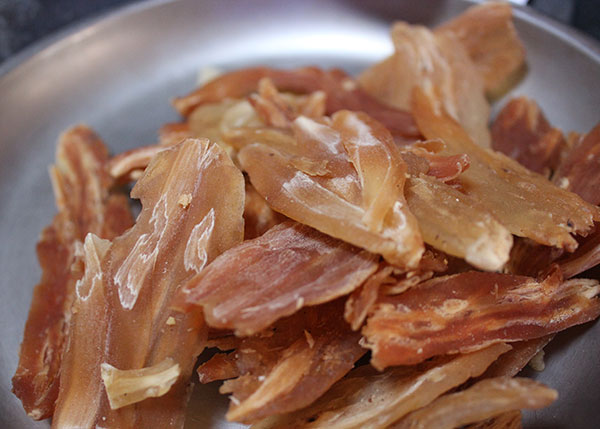
Asparagus root (Asparagus lucidus) is one of the major
Chinese herbs that works on all three treasures, supporting the lung,
heart and kidney systems. It is most famous in TCM as a Shen tonic
specifically used to calm the heart and is often prescribed as a natural
antidepressant because of its uplifting nature. It is also supportive
as a Chi and Jing tonic working as a natural energizer for the lungs as
well as a nourishing tonic for kidney Yin deficiencies. It is
particularly beneficial to women, taken to help increase fertility, sex
drive and used in many beauty formulas as it is known to add luster to
the skin. Asparagus lucidus is closely related to the Ayurvedic herb Shatavari (Asparagus racemosus) and is often used interchangeably.
Astragalus Root
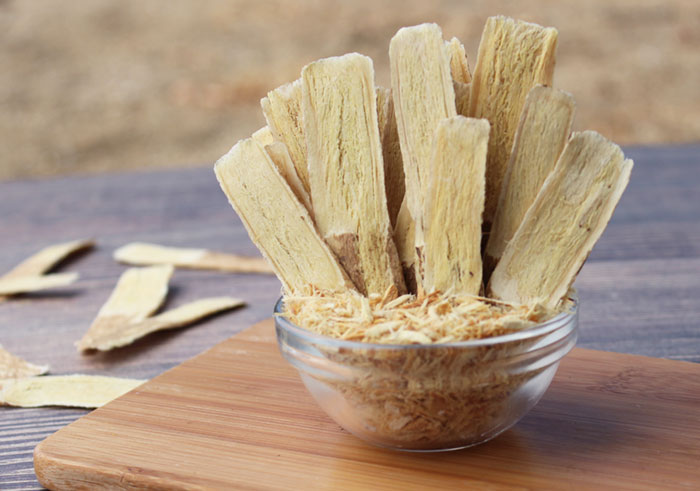
Astragalus root (Astragalus membranaceus) is a primary Chi (Qi) tonic that has been long revered as one of the most potent energizing tonics available next to ginseng. Working directly with the spleen and lung organ systems, the root is warming to the body and promotes strong musculature, good posture, and healthy respiratory, metabolic and eliminative functions. It is also well-known for its immune-enhancing attributes, containing unique astragaloside polysaccharides that encourage increased immune response. Astragalus contains a saponin called cycloastragenol which some health authorities believe is directly linked with what the Chinese call “Upright Qi.” This is thought to be the energy that counteracts the effects of gravity associated with the aging process.
Chinese Cinnamon
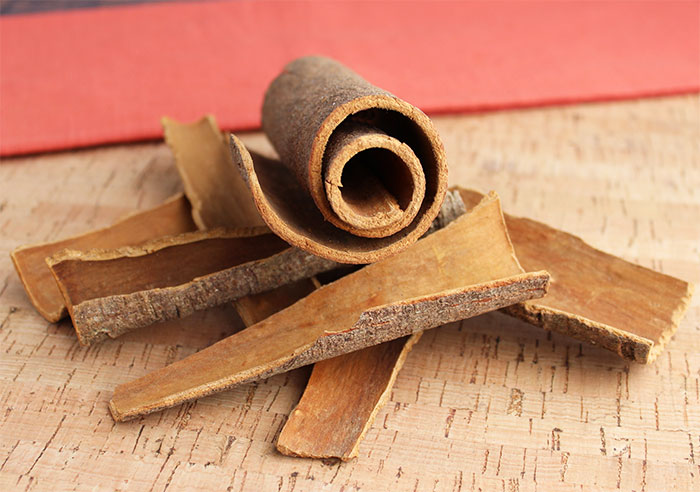
While it might seem somewhat unusual to call this common culinary
spice a tonic, but the cassia variety is in fact considered a Jing herb.
Also called Rou Gui, its hot energy and sweet pungent taste promotes
good circulation and helps balance cooling herbs used in tea
formulations. Both the bark and the twigs of the Chinese cinnamon tree (Cinnamomum cassia)
with their warming, yet demulcent qualities, increase Yang energies,
strengthen kidney Yang and are likewise considered mild sexual tonics.
The cassia variety should be used in small quantities because of its
potential liver damaging coumarin content that can be harmful when
consumed in very high doses. This is not the case with Ceylon cinnamon,
but Ceylon is less tonifying to the body.
Cistanche Stem
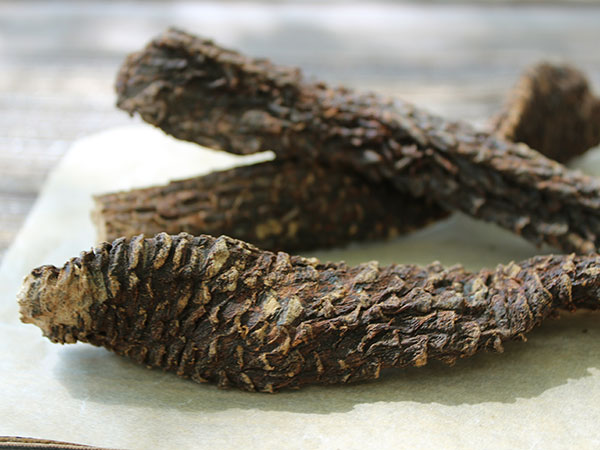
Cistanche (Cistanche deserticola)
is the stem of a desert plant most famous as a potent tonic for
enhancing sex drive and virility, often referred to as the “ginseng of
the dessert.” It is specifically a kidney Jing herb that works to
increase kidney Yang, offering several benefits that encourage optimal
functioning of the reproductive organs and glands. Like eucommia and
morinda, it is likewise strengthening the skeletal structure, especially
the back and knees. Cistanche extracts also fortify the Yin element and
are rejuvenating to the kidney-adrenal complex. The herb is made up of
unique plant compounds such as phenylethanoid glycosides and
cistanocides that contribute to its adaptogenic nature and range of
actions.
Codonopsis Root
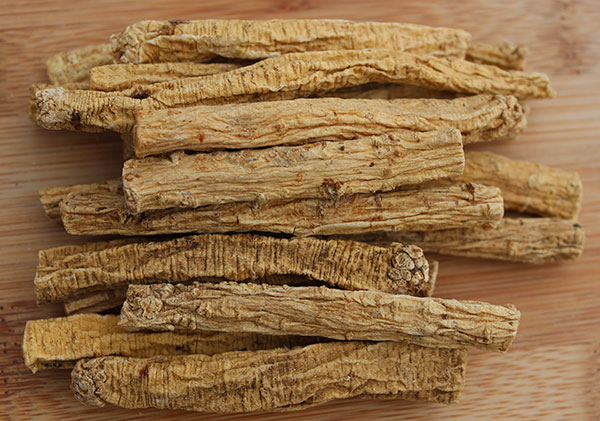
Codonopsis root (Codonopsis pilosula) is a mild, yet energizing, Chi tonic considered the “poor man’s ginseng” and often used in formulas as a ginseng substitute. It is not as strong as most ginseng varieties, which may be preferred by certain constitutions. Specific to the lungs and spleen, it helps to clear out excess mucus from the respiratory tract but also moistens and nourishes the tissues and organs where needed. It is particularly well-known for providing greater balance to the major metabolic systems. It also acts as a blood tonic to detoxify and build blood and encourages a beautiful complexion. It is considered a wonderful immune-boosting tonic root for those who are severely depleted or weakened after prolonged illness.
Cordyceps Mushroom
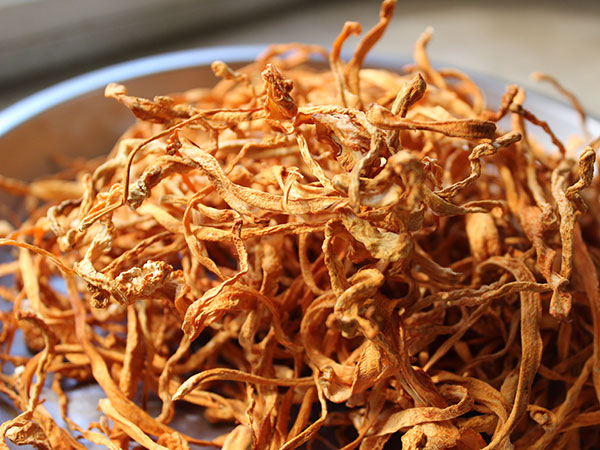
Cordyceps mushroom (Cordyceps sinensis or Cordyceps militaris)
was described by herbalist Li Chih Shen to be equivalent to ginseng in
its restorative qualities. As both a Chi and Jing tonic, it acts as an
immune system modulator and natural energy stimulant. Also known for its
effects at revitalizing the sex glands and reproductive system, the
mushroom is considered a potent aphrodisiac and top tonic for increasing
one’s sex drive. Cordyceps is known to be useful in recovery from
adrenal depletion and helps increase lung capacity as well as oxygen
utilization, making it a great tonic for improving athletic performance
and aerobic workouts. Cordyceps is a fungus that originally grew off of
insect bodies but today it is widely cultivated, usually on rice cakes.
Dong Quai Root
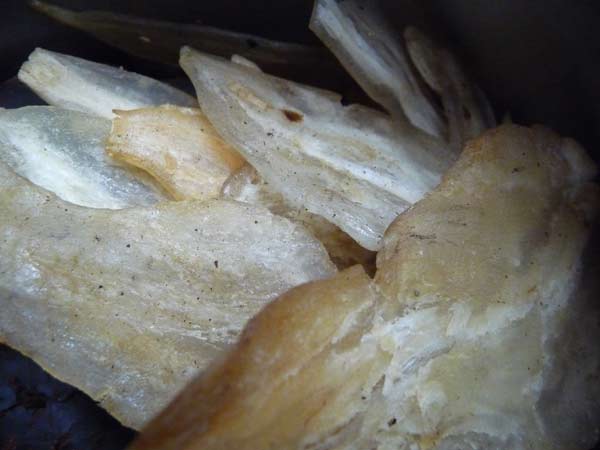
Dong quai (Angelica sinensis), also spelled dang gui or tang kuei, is a top blood nourishing tonic for both men and women, useful for revitalizing the blood and increasing circulation. As a Chi tonic, it has been praised as the “woman’s ginseng” because of its reviving effects on the female reproductive system. It is a commonly used ingredient in many Chinese patent formulas for this purpose. Working primarily with the spleen and liver systems, it is used to promote menstrual stability in women, reduces PMS symptoms and is also recommended for those with anemia to restore blood balance. Dong quai is good for men as well, helping to build muscle by increasing blood flow to the tissues.
Eucommia Bark
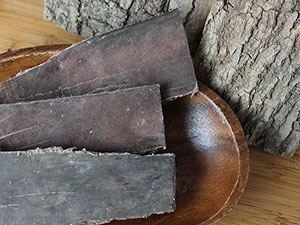
Eucommia (Eucommia ulmoides) is a potent kidney tonic and Yang Jing herb
most well-known for its ability to strengthen the skeletal structure of
the body. It is specifically effective for joint and back pain as well as
stiffness, especially in the knees, ankles and lower back. Eucommia, in many cases, can be used as a nutritional tonic for the
elderly to ensure healthy cartilage and to guard against conditions like
arthritis. Also considered a Yin Jing herb, it encourages flexibility in the ligaments and tendons and
is known to help fortify and nourish the bones. Eucommia additionally supports
healthy endocrine and sexual functions. It can be used
by both men and women for such purposes.
He Shou Wu
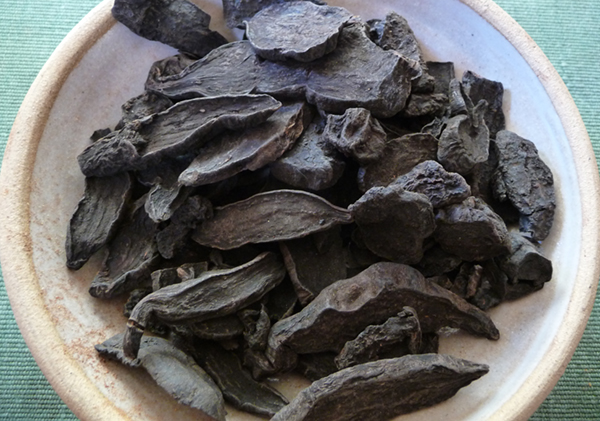
He Shou Wu (Polygonum multiflorum), or also called fo-ti, is a tonic adaptogen,
top superfood, and premier Yin Jing tonic. It is one of the fundamental
Chinese longevity herbs used extensively in TCM. According to Ron
Teeguarden, “This herb has been consumed by almost every Taoist master
that has ever lived.” It is very effective for replenishing kidney Yin
and deep deficiencies associated with adrenal exhaustion. While acting
as an energy restorative, it is simultaneously very calming to the
nervous system. Containing high amounts of zinc and iron, it can be
fortifying to the blood and also very cleansing to the liver. It is a
highly respected sexual stimulant that is known to encourage fertility
in both men and women. Fo-ti is traditionally “prepared” with black
soybeans to activate its health enhancing constituents. We do not advise
consuming herbal teas made with raw fo-ti root as they can be toxic to
the liver.
Ginseng Root
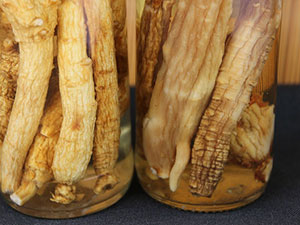
Ginseng (Panax ginseng),
is one of the most valued Chinese herbs used in Asia and known around
the world for its extremely energizing and health-promoting effects on
the body. As a premier Chi tonic, ginseng is a warming and stimulating
adaptogenic substance that is prized for its restorative and strength
building compounds, called ginsenosides. Ginseng has tonifying effects
on both the lung and spleen, the two organs responsible for extracting
energy from the foods we eat and the air we breathe. Although primarily
used to activate Chi, ginseng also works on all three treasures
including Jing and Shen as well as Chi. There are many different types
of ginseng roots with varying qualities depending on the source and age
of the root itself. American ginseng (Panax quinquefolius) is another variety that is often used as a sometimes preferred alternative because of its cooling nature.
Gynostemma Leaves
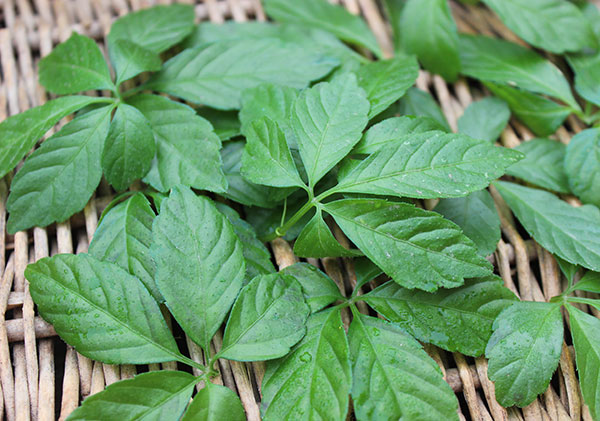
Gynostemma (Gynostemma pentaphyllum),
or jiaogulan, is a popular Asian green leafy herb commonly prepared as a
tea infusion. In Traditional Chinese Medicine, gynostemma leaf has
properties that are bitter and cool, and are beneficial to the lung and
heart organ systems. It is believed to offer effects that clear heat,
reduce inflammation, moisten the lungs as well as build adaptive energy.
The leaves are the most potent part of the plant, containing
triterpenoid saponins called gypenosides which are often compared to the
ginsenoside saponins found in Panax ginseng root. Both the saponins and
Gynostemma pentaphyllum polysaccharide content has shown to
exhibit antioxidant, anti-inflammatory and antitumor activity. Teas and
hot water extracts help prevent fatigue and are supportive to those with
cardiovascular conditions, type 2 diabetes, and obesity issues.
Jujube Dates

Jujube dates (Zizyphus jujube), or also called “red date”, are a Jing and Chi herb and blood cleansing fruit that are also known to regulate fluids, useful for either drying up excess mucus or moistening the tissues when needed. They are used to “clear the five openings”, which includes the eyes, ears, nose, throat, and sinuses. Jujube is a great harmonizing adjunctive herb to use with other tonics in herbal formulations. They are especially appropriate for neutralizing the fiery nature of Yang herbs, like ginseng. The dried fruit is added to preparations for toning and purifying the stomach, acting as a mild laxative.
Licorice Root

Chinese licorice root (Glycyrrhizae uralensis) is a deliciously sweet and unctuous tonic that is known as “the great adjunct” for its harmonizing or supporting influence when used with other Chinese herbs. This is due to its effectiveness at enhancing the main properties of other herbs and is, therefore, a common ingredient in many Chinese patent formulas or herbal preparations. It is a Chi tonic beneficial to the spleen, stomach, kidney and lung systems. Licorice is also known for its detoxifying effects that help to neutralize and eliminate toxins from the body. These cleansing attributes are said to “allow for all energies to flow more smoothly.” Licorice helps to enhance digestion and its cooling nature can be effective as a natural anti-inflammatory. It is building to the muscles and nourishing to the adrenals.
Lycium Fruit
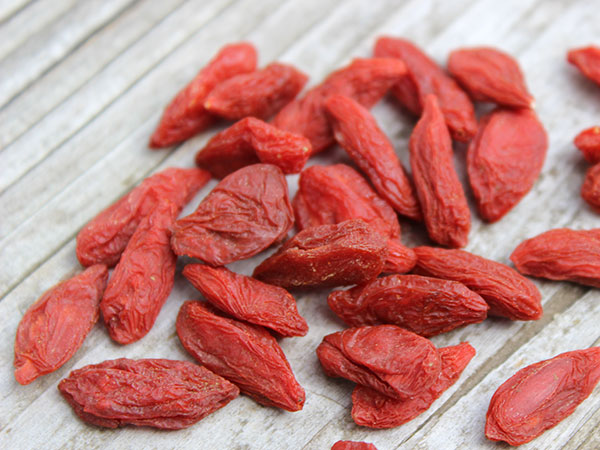
Lycium fruit (Lyciium barbarum), or also called lycii or goji berries,
are a tonifying blood tonic and Jing herb, helpful for improving
functions of the kidneys, liver and immune system. In Chinese medicine,
gou qi zi is considered a major tonic herb for restoring Yin Jing and
can be a nourishing decoction to use with other tonic herbs, like fo-ti
and rehmannia, in cases of kidney Yin deficiency, often associated with
kidney-adrenal burnout. High in species-specific polysaccharides
referred to as Lycium barbarum polysaccharides (LBPs), the
berries are known to stimulate the production of superoxide dismutase,
catalase and glutathione. Goji is comprised of carotenoids like
beta-carotene, and zeazanthin and are additionally a good source of
iron. They are often used as a harmonizing ingredient blended with other
Chinese herbs to increase their effectiveness.
Morinda Root
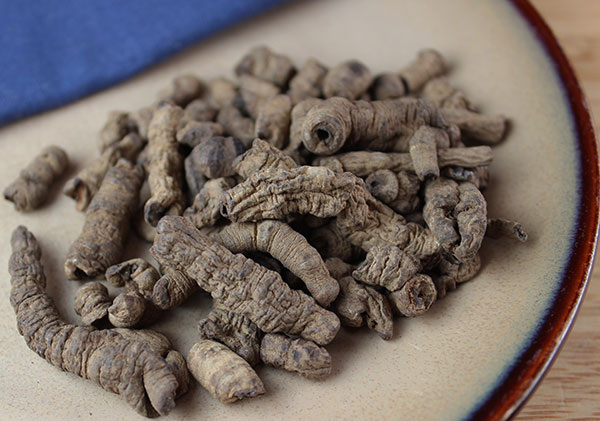
Morinda root (Morinda officinalis) comes from the same genus as noni fruit
and is a Yang Jing tonic with similar properties to that of eucommia
bark, it is also a very useful tonic for bone and joint health and is
commonly combined with eucommia in herbal formulations for these
purposes. It is influential as a strength-building herb and an often
added ingredient with other primal Jing preparations to improve, not
only physical strength but cognitive capacities. Morinda root is warming
to the kidneys and is used to treat kidney Yang deficiency and those
with specific sexual issues such as premature ejaculation, impotence and
infertility. It is additionally supportive to maintaining a healthy
cardiovascular system.
Rehmannia Root
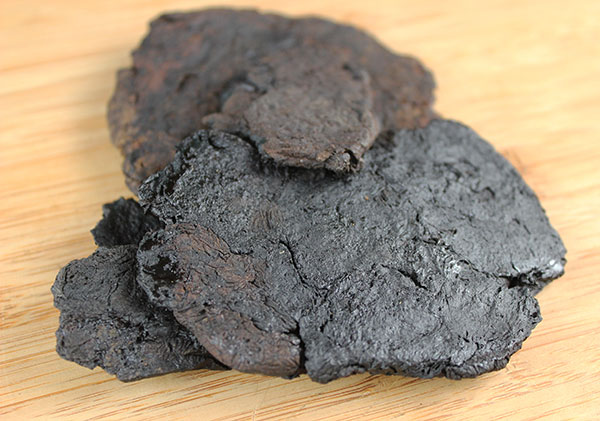
Rehmannia (Rehmannia glutinosa), is a thick dark root that
works specifically as a Jing herb, both as a blood and kidney Yin tonic.
Often compared to fo-ti root for its ability to nourish Yin depletion,
rehmannia is a prized longevity herb known to provide potent
restorative, building properties that can have a beneficial effect on
increasing fertility as well as sex drive. The root is used in tea
decoctions for strengthening the tendons, bones and bone marrow in
addition to supplying nutrients to the ears and eyes. Like fo-ti,
rehmannia is always usually “prepared” to activate its health-promoting
compounds that are specific for Yin deficiency. Raw roots, however, are
also used for other medicinal purposes.
Reishi Mushroom
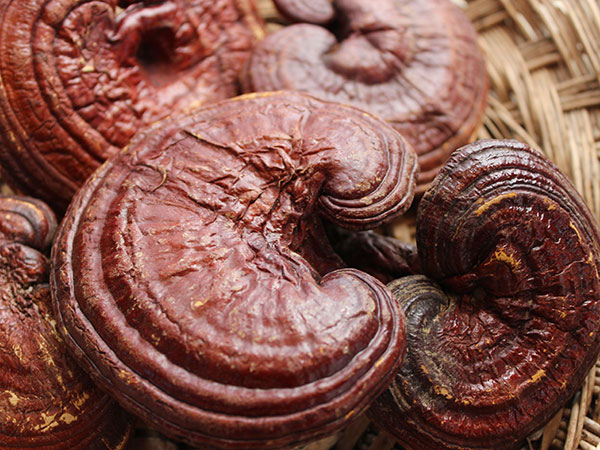
Reishi mushroom (Ganoderma lucidum) tonifies all three treasures: Jing, Chi and Shen and is often referred to as the “great protector”, guarding against the effects that physical, immunological and mental stress can have on the body over time. When taken consistently it is said to profoundly strengthen immune functions, calm and protect the nerves and help us to positively adjust to potential anxiety in our lives. Reishi is a highly respected Shen tonic renowned as the “herb of spiritual potency” for its ability to open the heart and encourage a meditative state of being. Reishi’s active ingredients include water-soluble polysaccharides and peptidoglycans, in addition to more than 100 triterpenes, like ganoderic acid, depending on the strain and quality. (*)
Rhiodiola Root
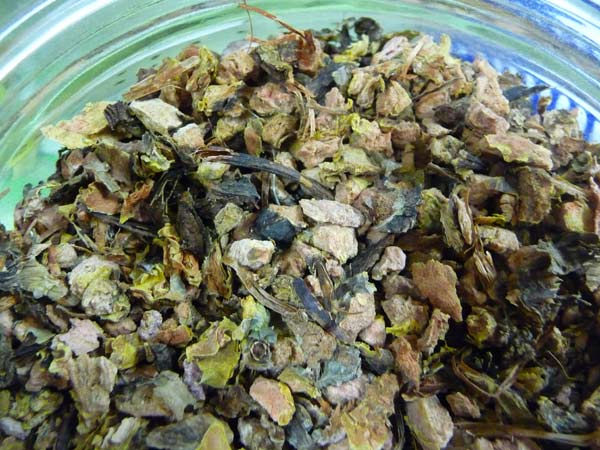
Rhodiola (Rhodiola Rosea) is considered a sacred herb among Asian as well Russian peoples. It is an energizing Chi tonic adaptogen particularly famous for its beneficial influence on reducing the secretion of cortisol, the “stress hormone.” It is often viewed as a top herbal aid for relieving daily stress and anxiety for this reason. It is well documented for its capacity to increase mental alertness and concentration skills, often recommended for overworked individuals or those who sit at a desk or do computer work for extended periods of time. Useful as a restorative herb for treating adrenal fatigue, it has also been shown to help effectively alleviate conditions such as insomnia and depression. It is tonifying to the lungs, heart, and effective as a strong immune system modulator.
Schizandra Berries
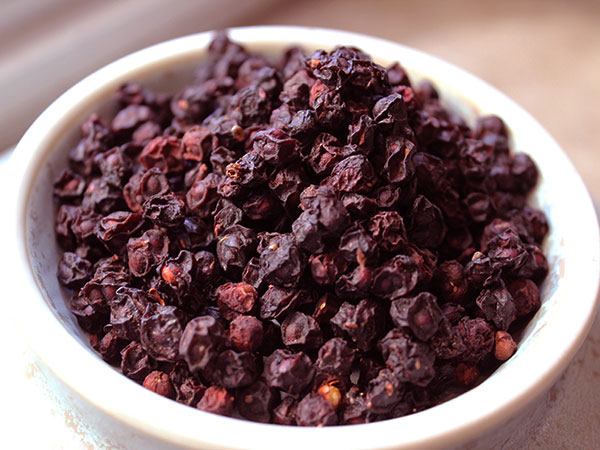
Schizandra berries (Schizandra chinensis)
are one of the most popular libido-enhancing tonics known in TCM,
rejuvenating the kidney Jing and increasing fluids to the reproductive
systems and sex glands. The berries work on all three treasures, Jing,
Chi, and Shen and also function as both a Yin and Yang tonic. Taking the
herb for periods of time is said to lubricate the area just under the
epidermis layer, providing for soft, supple skin. Subsequently, it has
been used in China by women of the imperial court specifically to
enhance and preserve a youthful appearance. Schizandra (also spelled
schisandra) is a blood purifier that also enhances eyesight and range of
vision. Many of the tonic effects to the skin and eyes are also a
result of its liver cleansing qualities. It is known to be one of the
only Chinese herbs to effectively enter all 12 meridians and is likewise
comprised of all 5 tastes. The berries are commonly soaked and brewed
as a “five flavor tea.”
When Not to Consume Chinese Herbs
These herbs are best taken when one is free of sickness and disease. Because major Chinese herbs are mostly building to the body rather than cleansing, it is also appropriate to stop taking tonics for a period time when undertaking cleansing or juice fasting protocols
According to Ron Teeguarden “It is a strict rule of Chinese tonic herbalism that the tonic herbs are
not to be used when acutely ill, even if the acute illness is just a
common cold. Correct any acute ailments before starting to use the
tonics, and suspend their use if and when you catch a cold or other
acute illness.”
Chinese Herbs and Pinyin Translations
Many times Chinese herbs are referred to by their Chinese/English names, not the “Western” names many use to identify them.
- American Ginseng – Xi Yang Shen
- Asparagus Root – Tian Men Dong
- Astragalus – Huang Chi (Qi)
- Cistanche – Rou Cong Rong
- Chinese Cinnamon – Guizhi and Rougi
- Codonopsis – Dang Shen
- Cordyceps – Dong Chong Xia Cao
- Coriolus – Yun Zhi
- Dong Quai – Dang Gui, Tang Kuei
- Eucommia Bark – Du Zhong
- Fo-ti – He Shou Wu
- Ginseng – Ren Shen
- Gynostemma – Jiaogulan
- Jujube Dates – Ta Tsao
- Licorice Root – Kan Tsao
- Lycium fruit (Goji berries) – Gou Qi Zi
- Maitake – Lian Hua Gu
- Morinda – Ba Ji Tian
- Reishi – Ling Zhi
- Rehmannia – Ti Huang
- Rhodiola – Hong Jing Tian
- Schizandra Berry – Wu Wei Zi
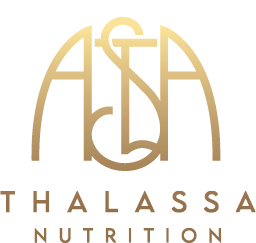
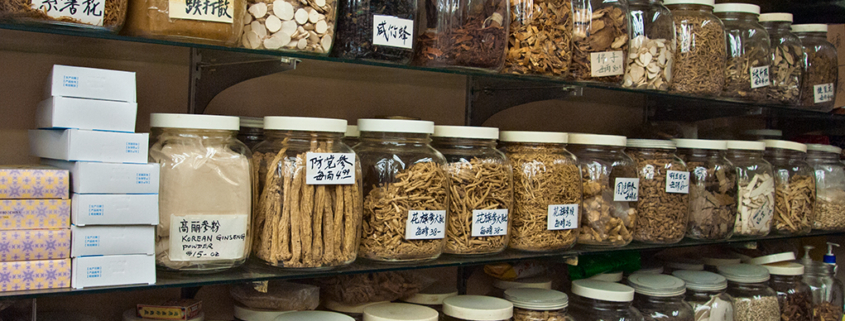 no
no no
no